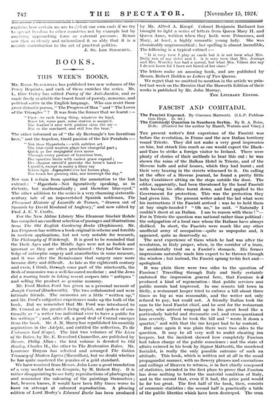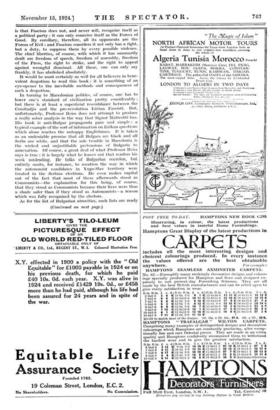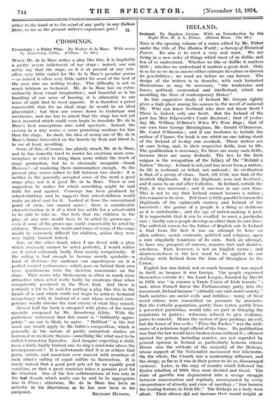FASCIST AND COMITADJI.
THE present writer's first experience of the Fascisti was before the revolution, in Fiume and the new Italian territory round Trieste. They did not make a very good impression on him, but struck him much as one would expect the Black- and-Tans to strike a foreign visitor to Ireland. There were plenty of stories of their methods to bear this out : he was shown the ruins of the Balkan Hotel in Trieste, and of the Slovene halls and solcol houses, which they had burnt ; and their very bearing in the streets witnessed to it. On calling at the office of a Slovene journal, he found a pretty little baby Carabineer sitting on the steps outside the door. The editor, apparently, had been threatened by the local Fascisti with having his office burnt down, and had applied to the Government for protection. This was the protection they had given him. The present writer asked the lad what were his instructions if the Fascisti arrived : was he to hold them at bay single-handed ? " Oh no," he said. " Naturally I couldn't shoot at an Italian. I am to reason with them ! "- For in Trieste the question was national rather than political : the subjugation of a local race whom the Italians have always disliked. In short, the Fascists were much like any other unofficial army of occupation—quite as unpopular and, it appeared, quite as deservedly so.
The next experience of them which he had was after the revolution, in Italy proper, when, in the corridor of a train, he accidentally trod on a Fascist's stomach. His former impressions naturally made him expect to be thrown through the window ; but instead, the Fascist sprang to-his feet and— apologized.
It was plain there were two sides to the question of Fascism ! Travelling through Italy and Sicily certainly endorsed the impression general here, that Fascism luel produced a kind of regeneration : that public services and public morals had improved. In one remote hill town in Sicily, a restaurant keeper tried to enforce a bill about three times as big as was reasonable, and the writer not only refused to pay, but could not. A friendly Italian took the case to the local Fascist chief, and he sent for the restaurant keeper, who arrived wrapped up in his great hood like a particularly baleful and rheumatic owl, and cross-questioned him severely. Then he took the bill and " wrote it down a quarter," and with that the inn keeper had to be content.
But once again it was plain there were two sides to the question. It may be all very well to mulct cheating inn keepers, but the incident showed how completely Fascism had taken charge of the public conscience : and the state of affairs evinced in his book by Signor Matteotti, the murdered Socialist, is really the only possible outcome of such an attitude. This book, which is written not at all in the usual propagandist manner, with no flowery phrases and execrations and callings of Heaven to witness, is in fact chiefly composed of statistics, intended in the first place to prove that Fascism has done nothing to better the material condition of Italy, and in the second that, even if it had, the price paid would be far too great. The first half of the book, then, consists of economic statistics : the second half is practically a table of the public liberties which have been destroyed. The crux is that Fascism does not, and never will, recognize itself as a political party : it can only conceive itself as the Forces of Good. By corollary, therefore, all its opponents are the Forces of Evil : and Fascism considers it not only has a right, but a duty, to suppress them by every possible violence. The chief liberties, of course, with which it has summarily dealt are freedom of speech, freedom of assembly, freedom of the Press, the right to strike, and the right to appeal against wrongful dismissal. All these, one can only say frankly, it has abolished absolutely.
It would be most certainly as well for all believers in bene- volent despotism to read this book : it is something of an eye-opener to the inevitable methods and consequences of such a despotism.
In turning to Macedonian politics, of course, one has to lower one's standard of civilization pretty considerably ; but there is at least a superficial resemblance between the Comitadjis and the pre-revolution Istrian Fascisti. But, unfortunately, Professor Reiss does not attempt to produce a really sober analysis in the way that Signor Matteotti has. His book is anti-Bulgar propaganda pure and simple : a typical example of the sort of information on Balkan questions which alone reaches the unhappy Englishman. It is taken as an undeniable premise that all Bulgars arc black and all Serbs are white, and that the sole trouble in Macedonia is the wicked and unjustifiable pretensions of Bulgaria to annexation. Of course, a great deal of what Professor Reiss says is true : it is largely what he leaves out that renders his work misleading. He talks of Bulgarian coercion, but entirely omits, for instance, to mention the way in which the autonomist candidates in Yugo-Slav territory were treated in the Serbian elections. He even makes capital out of the fact that most of them afterwards stood as Communists—the explanation for this being, of course, that they stood as Communists because their lives were thus a shade safer than if they stood as Autonomists—a reason which was fully recognized by the electors.
As for the list of Bulgarian atrocities, such lists arc ready (Continued on next page.) either to the hand or to the mind of any party in any Balkan
State, so far as the present writer's experience goes I H.












































 Previous page
Previous page